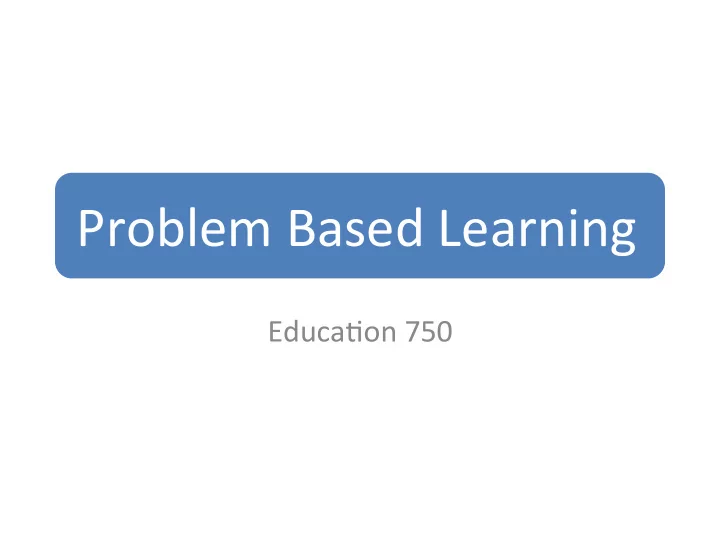

Problem ¡Based ¡Learning ¡ Educa4on ¡750 ¡
Overview ¡ • What ¡is ¡PBL? ¡ • How ¡do ¡you ¡do ¡it? ¡ • Should ¡you ¡use ¡it? ¡
(Some) ¡Teaching ¡Methods ¡ Ac4ve ¡Learning ¡ Lecture ¡ Self-‑Directed ¡ Experien4al ¡ Learning ¡ ¡ Inquiry ¡ PBL ¡
Instruc4onal ¡method ¡ characterized ¡by ¡the ¡ use ¡of ¡ problems ¡as ¡a ¡ context ¡for ¡students ¡ to ¡learn ¡ process ¡skills ¡ and ¡ subject ¡ knowledge ¡
How ¡does ¡it ¡(oOen) ¡work? ¡ First ¡Class ¡ • Read ¡Case ¡ • Iden4fy ¡ques4ons/issues: ¡Know ¡and ¡Need ¡to ¡Know ¡ Individually ¡ • Research ¡to ¡find ¡answers ¡ ¡ Second ¡Class ¡ • Discuss ¡and ¡share ¡findings ¡ • Evaluate ¡
Has ¡anyone ¡experienced ¡a ¡ different ¡format ¡for ¡PBL? ¡
Medical ¡ School ¡ Model ¡ Large ¡ PBL: ¡ Floa4ng ¡ Class ¡ Facilitator ¡ Facilitator ¡ Model ¡ Structures ¡ Peer ¡ Tutor ¡
What ¡might ¡be ¡the ¡quali4es ¡of ¡a ¡ PBL ¡facilitator? ¡
Student ¡Role ¡in ¡PBL ¡ Ask ¡ques4ons ¡ Find ¡answers ¡ Communicate ¡ Collaborate ¡ Self ¡and ¡Peer ¡Evaluate ¡
Facilitator ¡Role ¡in ¡PBL ¡ Course ¡Objec4ves ¡ Develop ¡Problem ¡ Prepare ¡Students ¡ Facilitate ¡Dynamics ¡ ¡ Balance ¡Guidance ¡ ¡ Feedback/Evaluate ¡
¡ ¡ Take ¡a ¡minute ¡to ¡write ¡down... ¡ How ¡might ¡you ¡explain ¡PBL ¡and ¡ the ¡PBL ¡process ¡to ¡a ¡colleague ¡ who ¡has ¡never ¡heard ¡of ¡PBL ¡ before? ¡
Sample ¡Case: ¡ Instruc>ons ¡
Sample ¡Case: ¡ Know ¡and ¡Need ¡to ¡Know ¡ ¡ In ¡groups ¡of ¡four: ¡ ¡ 1. Read ¡the ¡case ¡ 2. Individually, ¡iden4fy ¡issues/ques4ons ¡(5 ¡minutes) ¡ 3. Share ¡your ¡issues/ques4ons ¡in ¡group, ¡and ¡add ¡to ¡ the ¡list ¡(you ¡will ¡have ¡4me ¡to ¡look ¡for ¡answers). ¡ (10 ¡minutes) ¡
Sample ¡Case: ¡ Research ¡ Choose ¡one ¡ques4on ¡that ¡interests ¡you ¡and ¡find ¡ some ¡answers. ¡ ¡ • You ¡may ¡do ¡this ¡individually ¡or ¡as ¡a ¡group; ¡ ¡ • Possible ¡Resources: ¡ar4cles, ¡people, ¡online ¡ resources; ¡ • You ¡will ¡have ¡4me ¡to ¡share ¡your ¡answers ¡in ¡your ¡ group. ¡ ¡ ¡
Sample ¡Case: ¡ Discussion ¡ ¡ Teach ¡each ¡other ¡what ¡you ¡have ¡discovered; ¡ ¡ Record ¡some ¡key ¡findings ¡to ¡report ¡back. ¡ ¡
Sample ¡Case: ¡ Reflec>on ¡ ¡ • What ¡was ¡difficult ¡in ¡the ¡process? ¡ • What ¡did ¡skills ¡did ¡you ¡use? ¡ • How ¡did ¡you ¡feel? ¡ • What ¡strategies ¡worked ¡that ¡might ¡help ¡others? ¡ • How ¡would ¡you ¡change ¡the ¡process? ¡ • What ¡should ¡each ¡group ¡member ¡con4nue ¡doing? ¡ Change ¡to ¡improve ¡for ¡next ¡4me? ¡ • What ¡were ¡the ¡key ¡content ¡points ¡you ¡learned? ¡ • What ¡surprised ¡you? ¡
¡ ¡ Take ¡a ¡minute ¡to ¡write ¡down... ¡ How ¡might ¡you ¡explain ¡PBL ¡and ¡ the ¡PBL ¡process ¡to ¡a ¡colleague ¡ who ¡has ¡never ¡heard ¡of ¡PBL ¡ before? ¡
How ¡do ¡you... ¡ Evaluate? ¡ DISCUSSION ¡CONTRIBUTORS: ¡ Self-‑Evalua4on ¡ Peer-‑Evalua4on ¡ ¡ Facilitator ¡Evalua4on ¡ WRITTEN ¡SUMMARIES ¡FOR ¡EACH ¡CASE ¡ ESSAY ¡ TRIPLE ¡JUMP: ¡Individual ¡PBL, ¡in ¡class ¡wri4ng ¡(large ¡classes) ¡
How ¡do ¡you... ¡Write ¡a ¡Problem? ¡ Real ¡World ¡ Develop ¡a ¡ Objec4ves ¡ Context ¡ Story ¡ Teacher’s ¡ Staging ¡and ¡ Resources ¡ Objec4ves ¡ Format ¡ Guide ¡
Think ¡of ¡a ¡concept ¡that ¡you ¡might ¡develop ¡as ¡ a ¡PBL ¡case ¡in ¡your ¡proposed ¡course. ¡ ¡
What ¡concerns ¡do ¡you ¡have ¡about ¡using ¡ PBL ¡in ¡your ¡course? ¡
Should ¡you ¡use ¡PBL? ¡ Student ¡Experience ¡ • >standardized ¡content ¡exams, ¡<recall ¡and ¡prac4cal; ¡ ¡ • Mo4va4on ¡and ¡ajendance ¡increases; ¡ • Study ¡4me ¡higher ¡for ¡PBL ¡and ¡more ¡during ¡the ¡day ¡and ¡ greater ¡library ¡use; ¡ • Evidence ¡of ¡reliance ¡on ¡group ¡decision ¡making; ¡ • ~20% ¡less ¡content ¡coverage; ¡ • Higher ¡sa4sfac4on ¡and ¡enjoyment ¡(lower ¡stress). ¡
Facilitator ¡Experience ¡ • Similar ¡4me ¡commitment, ¡but ¡differently ¡weighted; ¡ • Expert ¡in ¡content ¡vs. ¡expert ¡in ¡facilita4on; ¡ • More ¡4me ¡required ¡for ¡courses ¡<100 ¡students; ¡ • Same ¡cost ¡for ¡faculty ¡and ¡tutors; ¡ ¡
What ¡do ¡we ¡know ¡about ¡“Good ¡Teaching”? ¡ ¡ 1. Encourages ¡contact ¡between ¡students ¡ and ¡faculty; ¡ 2. Uses ¡ac4ve ¡learning ¡techniques; ¡ 3. Gives ¡prompt ¡feedback; ¡ 4. Emphasizes ¡4me ¡on ¡task; ¡ 5. Communicates ¡high ¡expecta4ons; ¡ 6. Respects ¡diverse ¡talents ¡and ¡ways ¡of ¡ teaching. ¡ Chickering ¡& ¡Gamson ¡(1987) ¡
Reflec4on ¡ ¡ Why ¡might ¡you ¡use, ¡or ¡not ¡use, ¡ Problem ¡Based ¡Learning ¡in ¡your ¡ course? ¡
Recommend
More recommend